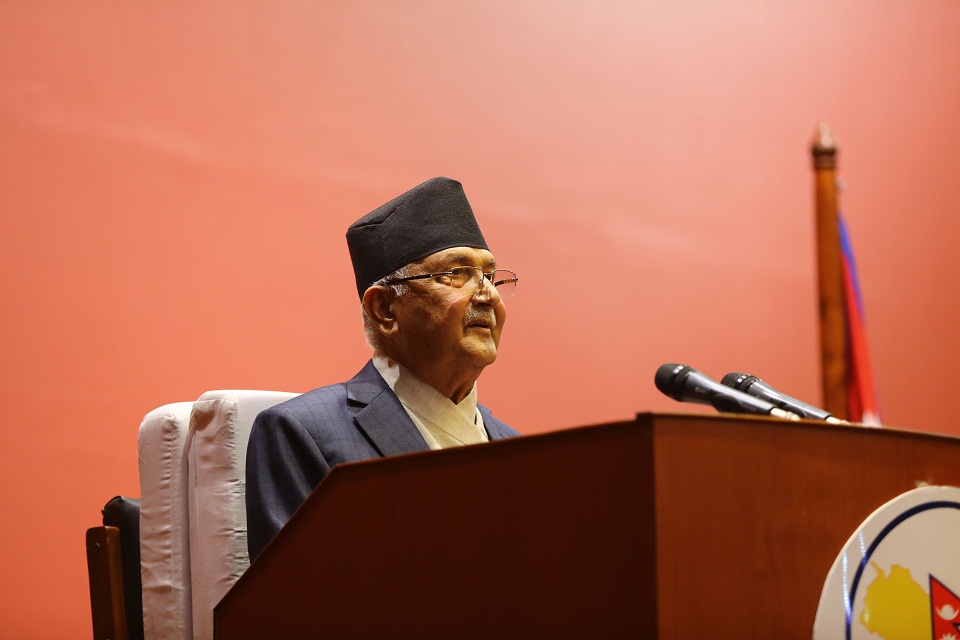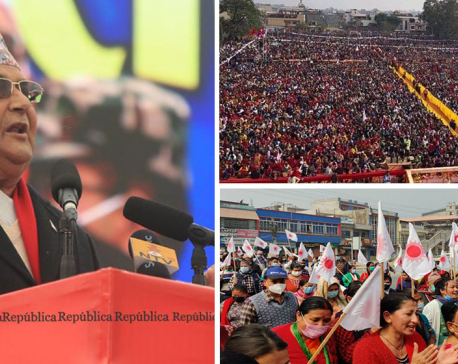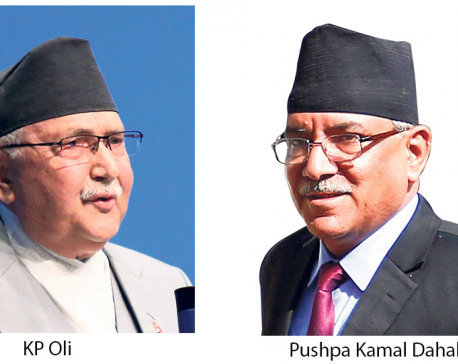
OR
#News Analysis
Embattled PM Oli grows stronger as ‘ideological polarization’ begins within ruling NCP
Published On: July 31, 2020 07:54 AM NPT By: Kosh Raj Koirala | @KoshRKoirala

KATHMANDU, July 31: With the start of an ‘ideological polarization’ among the leaders of the erstwhile CPN-UML and the CPN (Maoist Center) which merged to form the ruling Nepal Communist Party (NCP), the embattled Prime Minister K P Oli has grown stronger within the ruling party in recent days.
The ‘ideological polarization’ within the NCP that was formed following unification between the two parties ahead of the parliamentary election in 2017 has not only helped Prime Minister Oli to secure the support of most UML leaders, but has also put Chairman Dahal on the backfoot.
While youth leaders of the erstwhile UML deemed close to the rival faction have emerged closer to the Prime Minister Oli to save what they describe as ‘party unity’, senior leader Nepal, who backed Dahal’s bid to oust Oli from power, has also ‘toned down’ conspicuously avoiding the demand for Oli’s resignation in his public statements. Leader Nepal has lately emphasized only the need to run the party systematically and according to the party’s statute.
Amid mounting pressure within the party to step down from power, Prime Minister Oli offered his support to elect Dahal as the chairman of the party if he accepted the ‘people’s multi-party democracy’ on July 18. While Chairman Dahal did not immediately accept the proposal, this left senior leader Nepal ‘suspicious’ about the intention of Oli and Dahal and he even spoke in public that the agreement between Dahal and Oli alone won’t solve the problem that has surfaced within the ruling party.
In the days that followed, leader Nepal tried to distance himself from Chairman Dahal. During a meeting held at the residence of Chairman Dahal in Khumaltar, leader Nepal argued that the issue of ‘people’s multi-party democracy’ should be taken among party cadres for discussion. Vice Chairman Gautam, who backed Dahal in seeking the ouster of Oli from power, also said that ‘people’s multi-party democracy’ is their political ideology and that he cannot afford to give that up.
This development has not only helped Oli to secure a majority in the nine-member Secretariat body of the party, but also considerably strengthened his position in the party’s 45-member Standing Committee. Rival faction leaders believe that Prime Minister Oli has also secured the support of majority lawmakers of his party in his favor. The NCP has a total of 174 lawmakers in the House of Representatives (HoR) that elects the prime minister.
The erstwhile Maoist Center pursued ‘people’s democracy of the 21st century’ and the ‘Prachanda Path’ as its political ideology. As a part of the merger agreement between the two parties, the NCP’s ideology now consists of Marxism-Leninism and support for a multi-party system in Nepal.
In a meeting of former Maoist leaders held at his residence in Khumaltar on July 20 -- two days after Prime Minister Oli’s proposal-- Chairman Dahal even said that former UML leaders were united on the basis of their political ideology and that it was necessary for the former Maoist leaders also to stand united on the basis of their party’s political ideology.
The meeting of the former Maoist leaders, however, concluded that they would be left in a weaker position in the party if the ‘ideological polarization’ was allowed to grow further within the NCP. The Maoist leaders gathered at Khumaltar suggested to Chairman Dahal to exercise maximum flexibility and reach a dignified ‘power-sharing deal’ with Prime Minister Oli in an apparent bid to stop the growing polarization.
Chairman Dahal is on the backfoot as Vice Chairman Gautam, who earlier backed Dahal in seeking the resignation of Prime Minister Oli, amid intense ideological polarization within the party. Gautam even proposed allowing Oli to stay as Prime Minister until the remaining term of the House of Representatives (HoR) and chairman of the party until the unity general convention that Prime Minister Oli proposed to hold by mid-December. Gautam even proposed allowing Oli to stay as Prime Minister until the remaining term of the House of Representatives (HoR) and chairman of the party until the unity general convention that Prime Minister Oli proposed to hold by mid-December.
Gautam’s proposal not only weakened Dahal within the party, but also his demand to seek the immediate resignation of Prime Minister Oli from the post. What has put Dahal in a further defensive position is the decision of former Maoist leaders including Secretariat member Ram Bahadur Thapa and the Standing Committee members Mani Thapa, Lekh Raj Bhatta, Top Bahadur Rayamajhi and Haribol Gajurel deciding not to support him openly.
As Prime Minister Oli is said to be preparing to reshuffle his cabinet, leaders close to senior leader Nepal have also softened their stance against Prime Minister Oli. While leaders including Surendra Pandey and Bhim Rawal have stopped short of criticizing Prime Minister Oli in recent days, youth leaders Yogesh Bhattarai and Ghana Shyam Bhusal have acted as mediators to save the ‘party unity’.
As the party’s Standing Committee meeting has failed to make any headway to resolve the intra-party dispute within the NCP, over 150 Central Committee members close to Chairman Dahal and senior leader Nepal on Wednesday demanded the party’s Central Committee meeting. Party insiders say the meeting, even if convened at all during the COVID-19 pandemic, is less likely to affect the hold of Prime Minister Oli in the party as ‘ideological polarization’ will be at play.
You May Like This

Better you come to Butwal and see what a mass gathering looks like, Oli tells Dahal
KATHMANDU, Feb 13: Following the dissolution of the lower house of the federal parliament and announcement of the midterm election,... Read More...

Oli, Dahal fix NCP secretariat meeting for Friday
KATHMANDU, June 20: Chairpersons duo of the ruling Nepal Communist Party (NCP)—K P Oli and Pushpa Kamal Dahal—have agreed to hold... Read More...

Oli elected NCP parliamentary party leader
KATHMANDU, May 20: With the Nepal Communist Party (NCP) electing Prime Minister K P Sharma Oli as its parliamentary party (PP)... Read More...





Just In
- MoHP cautions docs working in govt hospitals not to work in private ones
- Over 400,000 tourists visited Mustang by road last year
- 19 hydropower projects to be showcased at investment summit
- Global oil and gold prices surge as Israel retaliates against Iran
- Sajha Yatayat cancels CEO appointment process for lack of candidates
- Govt padlocks Nepal Scouts’ property illegally occupied by NC lawmaker Deepak Khadka
- FWEAN meets with President Paudel to solicit support for women entrepreneurship
- Koshi provincial assembly passes resolution motion calling for special session by majority votes






_20220508065243.jpg)






Leave A Comment